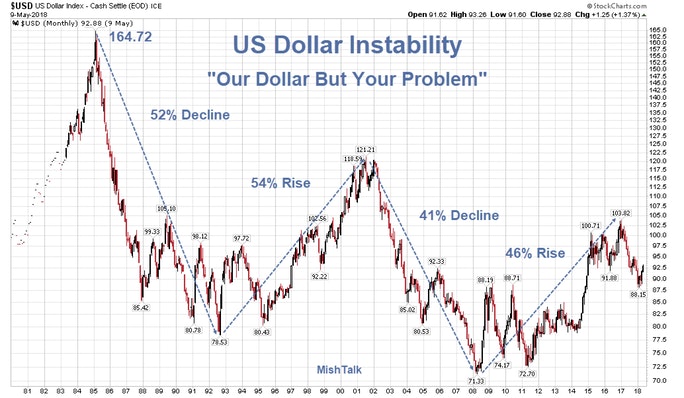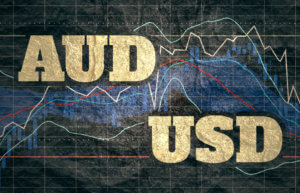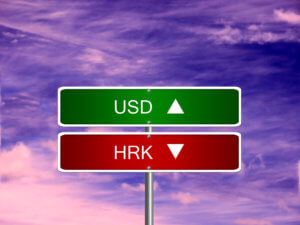As one of the major currencies on the globe and a currency that holds such importance for the rest of the world, the USD has always posed as a topic everyone is interested in. Due to these reasons, it is crucial that we understand the economic situation worldwide and grasp which role the official currency of the United States of America has to play. Currently, we are seeing many changes in various aspects of existence as we know it and, despite the vastness of the media sources, many are still vague or unsure about what is going to happen down the road. Naturally, it is essential for these reasons to delve into the knowledge we have accumulated so far both on the USD and its connections to other spheres of life, discuss its relevance outside the realm of forex, and, last but not least, list some of the most thought-provoking predictions proposed by prominent prop traders in the market.
From the perspective of technical analysis, we are safe to state that the USD is one of the most difficult currencies to trade. Generally, the currency is often portrayed as such owing to the involvement of the big banks that have a tendency to flock towards the greatest concentration of money. As the USD is the currency of preference among traders across the globe, the big banks, understandably, desire to maintain more control over the USD-based currency pairs. What is more, since currencies are always traded one against the other, the USD as the currency encumbered with more news events is often going to bear the responsibility of whether the currency pair goes up or down.
In the past, we have seen how the USD frequently acted as a determinant of which direction the pair it is part of is going to take and both news and banks play a major role in how this typically plays out. In addition, history has shown how any event taking place in the United States appears to have an impact on the rest of the planet and, as such, they assign more importance to the USD over any other currency. The USD is also known as a safe-haven currency towards which people of various backgrounds are naturally driven. This currency is additionally the world’s reserved currency and countries all over the world tend to hold the dollar as a hedge to protect their systems.
Trading the USD is a particularly important topic due to the vigilance of the big banks and increased risk for the traders. Forex experts generally advise traders to apply the same strategies as with any other currency but also insist on exercising caution especially early on. Should traders with more experience show interest in trading a USD-based pair, they are advised to proceed with the use of their tested systems and combinations, whereas forex beginners are warned about the possibility of facing some unfavorable circumstances dissimilar to any other currencies. It appears that most traders face challenges with the USD. In addition, as it appears, many end up losing everything because of a deadly combination of negative factors: highly risky currency, poor money management, and lack of knowledge on trading psychology. Therefore, when trading the USD, it is important to involve a variety of skills and maintain awareness of other factors that can potentially affect the trade.
When trading the USD, or any other currency for that matter, most traders focus all of their energy and attention on the offense in the attempt to extract the greatest possible amount of money from the market. However, on the other end of the spectrum, there is defense as an equally important determinant of the success a trader can experience. Many assume that the acquisition of skills, tools, and systems will render them the most accomplishments in this world, but even the best technical traders can experience a great loss if they fail to grasp the need to see both sides of the coin. The defensive part of the strategy is, at times, probably less exciting, yet it is at the same time the necessary addition to the offense, complementing and rounding out the comprehensive approach every trader needs to be take in trading currencies.

Upon learning about money management, trading psychology, and technical analysis, as the three pillars of offense, traders are left with the additional task of figuring out how to hold the fort on the other end of the continuum. Long-term defense strategies that any forex enthusiast should list as a top priority include the diversification of money and protection from a major economic downturn. If a trader manages to assemble the two constituent parts and put effort into satisfying both criteria, success is guaranteed no matter what events are taking place in the market. By following these pieces of advice, challenges can be successfully mitigated with even difficult currencies such as the USD.
The next level of trading involves the questions of what happens to any trader’s money once a trade is completed, what is in the cards with regard to the future of investment, and which plan of action a trader has developed to further conquer new goals and/or challenges. Some forex experts greatly criticize the financial news sources, despite their popularity and presence, in relation to their ability to give information on world economics. Sources such as CNBC and Bloomberg are some of the most prominent sources of financial-related information, yet forex connoisseurs claim that these companies always seem to be bullish on the economy because they are paid to maintain this positive flair by various sponsors. Banks, companies selling financial products, and brokerage firms are some examples of sponsors who have an interest in maintaining and preserving a positive outlook on the market regardless of what is currently happening.
While these sources do provide correct facts or numbers, traders still need to consult with some other sources to obtain additional information and get the full picture, as some theories or pieces of information can never be found in the mainstream media. The sources providing information on gold, for example, provide an excellent sample of how detailed and useful the media can be, as they are both bearish on the economy but they still give out real and relevant data. In order for traders to have a good defense, they need to see beyond biased media and get as much information as possible to see the whole picture.
In order for any trader to play defense in trading the USD, the information on the status of this currency as a safe-haven, the reserved currency of the world is extremely important. US citizens, for example, rarely diversify their money, which can be particularly dangerous in times of recession that are simply unavoidable. Recessions are a recurring theme in any market that preserve the overall health of the economy. As we can see from the table below, recessions always happen, sooner or later, lasting for a minimum of one year and usually a few years apart (see the number within brackets). Now, more than a decade after the last recession, we are witnessing the major impact the COVID-19 pandemic had on the world economy, putting more stress on the importance of learning how to protect one’s finances thoroughly.
| Recessions in the United States | |
| 1953—1954 (4) | 1980 (5) |
| 1957—1958 (3) | 1981—1982 (1) |
| 1960—1961 (2) | 1990—1991 (7) |
| 1969—1970 (8) | 2001 (10) |
| 1973—1975 (3) | 2007—2009 (6) |
While the results of any recession can be truly devastating, it is important to note how the forex market is practically impervious to their damaging effects owing to the fact that fiat currencies simply have no intrinsic value. As traders in the spot forex market trade one currency against the other, what they can expect is for the market conditions to potentially dictate whether a currency pair goes up or down. The profit, however, is not something traders need to be concerned with in these cases, as the negative state of the market does not affect trading in this manner, especially if the ones doing the trade are knowledgeable and experienced in terms of trading currencies. While this is a trait unique to the forex market, it is vital that traders understand that as long as the trade is shielded from the damaging effects of a recession, they are not.
Many traders are quite diligent and well informed with regard to the variety of methods of earning money and their financial endeavors may often range between stock, bonds, IRAs, real estate, and businesses to trading currencies. With the increased number of sources of money, traders understand that even if stocks decrease in value, bonds may go up, which understandably brings them a heightened level of security. Therefore, from a financial standpoint, traders feel fully covered because they have secured financial income from multiple sources that can bring them profit. Nonetheless, this plethora of revenue streams may still not be an indication that traders are sufficiently diversified, and the lack of understanding of what proper diversification means can potentially endanger all trader’s efforts.
When we compare all sources of income listed above (e.g. stocks, forex, etc.), there is one shared characteristic, or one common trait, that makes the difference in terms of diversifications – the means of payment. When a trader receives compensation for all his/her business endeavors in one single currency, they are likely to suffer from any external factor that affects the currency in question. This is a particularly important topic for the United States, whose currency has never truly depreciated to the extent of the question of its stability to arise. While the currency fluctuated up and down as part of its natural tendency, it thus never raised concerns that would propel the US citizens to truly think of the need to diversify the list of currencies they rely on.
While the USD is still perceived as a safe-haven or reserved currency, the period of its glory may be slowly (or not so slowly) coming to an end as the hierarchy in terms of production and finances is changing on a global scale. Although the USD has not lost its position as the strongest currency, we have seen how risky certain situations concerning the US economy and currency were in the past 10 to 15 years, when the US government took extreme measures in order to preserve the stability. In each of such difficult stances in history, the US would typically decide to print more money, making it the only country on the planet to rely on quantitative easing as much.
As an extreme method of boosting the economy, the time may come when all dues may have to be paid eventually in this respect, which will in effect have quite terrible effects on anyone who has ever put his/her hopes in the USD alone. Coupled with the past moves of the US against other world countries in the attempt to dominate or maintain its strength, we can expect them to use every opportunity to get themselves out of the inferior position. While from the perspective of history many such wars were carried out through the involvement of the military, we are starting to see a new form of battles taking place on the financial plane.
Whether any decision the US has made in the past can ricochet right back and affect anyone involved or not, we can all agree that taking necessary precautions is very much a need today. While extending your portfolio to other business deals and endeavors is most definitely a favorable decision, long-term your finances do depend on the diversification of the currencies you depend on in the sense of remuneration. As the US is known for its tendency to hold one currency and traders are very much accustomed to enjoying the stability of the currency, the best choice to be made in this case is to include other currencies as well. Traders should, then, discover another currency on which they are long-term bullish and use them to half the risk that comes with putting all eggs into one basket. Some forex experts for example state that gold, as well as silver, is another extremely useful way to protect oneself from limiting options a single currency brings.
Generally, the precious metals market has proved to bring more benefits and one can compare them to stable coins from the crypto market, while the downside is quite small. The crypto market too is said to have an amazing upside and can help a trader stop depending on the USD, or any other currency alone for that matter. Therefore, if traders rely on other currencies as well, hold metals, and invest in cryptocurrencies as well, they both protect themselves and reduce the downside of trading/holding one currency alone.
With regard to where a trader should invest his/her finances, we can compare some events currently taking place with some of the forex experts’ views. The EUR, for example, may not be a good option because many countries are now making decisions to leave the European Union and, interestingly enough, EUR/USD may be one of the worst pairs to trade out of all 28 combinations with 8 major currencies. Moving towards another European country, the United Kingdom also proves to inspire little confidence in forex traders, as many believe that the downside of investing long-term in the GBP is too great at the time.
The AUD is another currency with a poor long-term outlook for investment due to the reduced exchange between Australia and China, poor housing market conditions, and the expectation of the economy to enter recession soon, supported by the facts and numbers given in some alternative sources other than mainstream media. In terms of economy, the NZD successfully withstood the last elections, which only confirms the health of the currency and the country’s economy, yet experts still are still doubtful with regard to investing in the currency, alike in the JPY. The Canadian political climate seems not to be pro-money at the moment, which is the last of the currencies that traders should not consider in terms of long-term investment.

One of the most prominent forex personalities shared that he used to hold the following three currencies: the USD as his homeland currency, the CHF due to the unique neutrality and banking system in Switzerland, and the CNY because of the country’s continuous efforts to improve their economy. He also shared that he decided to invest his finances into other currencies as well, so he kept asking the question of which currencies he is bullish on. While making the decision where to put his money, the question of which countries represent the values that are reflected in their official currencies arose. At the same time, he started to notice how both rich people and big companies all shared the same inclinations to move from the West and turn to countries that have fewer taxes, serve as a nice place to live, offer a great business climate, and avoid liber politics that are believed to be damaging for the world of finance. This forex expert also shared how he eventually decided to split the amount of money invested in the CNY and allocate the second half in the RUB, since he strongly feels that Russia is on a good path, in addition to some smaller countries’ currencies due to their budding markets.
Forex experts are slowly revealing their beliefs that the world power is shifting to the East, supporting their view with the facts regarding some events that are already taking place. We are seeing a strong determination of many countries in the East to purchase precious metals, reflecting a significant gold-buying program that may reveal more than a desire to grow a country’s capital. Russia, China, Iran, and Azerbaijan significantly increased their gold reserves, while India showed a greater interest in silver for its central reserves. As quite a pricy move, the purchase of precious metals is rather interesting, especially on such a large scale involving so many countries. What is more, we know that precious metals are indeed precious for their intrinsic value and are unlikely to depreciate in value, especially since their supplies are limited. In the case of a currency war, currencies would be the first in line to drop in value as a result of a poor economic downturn, whereas any country with heavy reserves of precious metals would not only be safe but could easily move the center of power in its direction.
With such a massive move towards precious metals that is noticeable in several countries, the lessons are there for the taking. If wealthy people and countries having more money than any forex trader can ever imagine are deciding to start buying gold to this extent, why should forex traders refrain from making the same move themselves? What is more, precious metals are always a good commodity to have regardless of exterior factors and current circumstances. Nevertheless, especially now, at these uncertain times, holding precious metals can be perceived as a smart business investment that can provide you with added security.
Investing in the crypto market also appears to be a tremendous opportunity for sustainable financial growth and security. However, even the most immersed crypto enthusiasts do not actually know where this market is going to go and how it is going to develop. In addition, while the downside of trading cryptocurrencies can be quite dramatic, taking you right down to zero, the upside is very likely to be extremely good. Nonetheless, despite the danger it involves, the crypto market still offers much value as a form of diversification, protecting you even if all of your other business ventures fall apart.
If traders secure themselves by entrusting their finances in different markets, i.e. forex, crypto, and metals, it will provide a great source of security and prove to be an extremely wise decision, especially in times such as the ones we are currently living. The return on such investments can double in the sense that once any recession is over, which often last approximately one to two years, a trader can buy any stock ties for example for a much cheaper price and thus increase his/her finance increasingly fast. That way, these individuals will easily find themselves on top, as most people are unable to do the same due to the effect the recession had on them. What is more, with such a vast variety of instruments for making money, traders can feel comfortable in case any one of them goes down because, as it often goes, another source of income will start to increase in value to substitute for the loss experienced in some other market.
In conclusion, although the USD is still seen as one of the strongest currencies worldwide and a currency of choice in terms of country reserves across the globe, traders need to think of diversification outside the forex market. Invest in techniques, methods, and systems that you use in trading currencies and, by all means, combine these experiences with other instruments that will provide you with security and stability should the USD or the US market start to depreciate in the future. And, lastly, even if you are just a beginner, or even more so, choose to invest your money no matter how small the amount is elsewhere because defense is equally important to offense.






